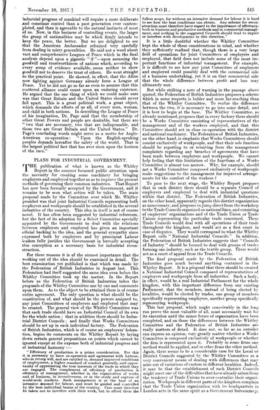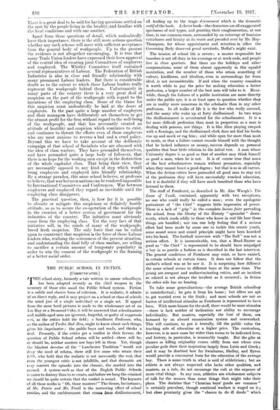PLANS FOR INDUSTRIAL GOVERNMENT. r FRE publication of what is
known as the Whitley I_ Report in the summer focussed public attention upon the necessity for creating some machinery for bringing employers and employed together so as to improve the present methods of governing their common industries. That Report has now been formally accepted by the Government, and it remains to be seen what action will be taken. The main proposal made by-the Committee over which Mr. Whitley presided was that joint Industrial Councils representing both employers and workpeople should be established in the several industries of the country. This idea in itself is not of course novel. It has often been suggested by industrial reformers, but the fact of its adoption by a Select Committee specially appointed by the Government to deal with the relations between employers and employed has given an important official backing to the idea, and the general sympathy since expressed both by employers and by prominent Labour leaders fully justifies the Government in formally accepting this conception as a necessary basis for industrial recon- struction.
For these reasons it is of the utmost importance that the working out of the idea should' be examined in detail. The best examination yet published is that which was made by the Federation of British Industries in August last. This Federation had itself suggested the same idea even before the Whitley Committee took up the matter. In the Report before us the Federation of British Industries takes the proposals of the Whitley Committee one by one and comments upon them. As to the.object to be attained there is of course entire agreement. The only question is what should be the constitution of, and what should be the, powers assigned to, any joint Committees of employers and employed that may be created. The general view of the Whitley Committee was that each trade should have an Industrial Council of its own for the whole nation ; that in addition there should be Indus- trial District Councils ; and finally that Works Committees should be set up in each individual factory. The Federation of British Industries, which is of course an employers' federa- tion, begins its comments on the Whitley Report by laying down certain general propositions on points which cannot be ignored except at the expense both of industrial progress and of industrial harmony Efficiency of production is a prime consideration. For this it is necessary to have co-operation and agreement with Labour, who in return will, and.are entitled to, demand improved conditions of employment, a higher standard of comfort generally, and oppor- tunity of appreciating the true interests of the trade in which they are engaged. The complement of efficiency of production is efficiency of management, whether in the organisation of works and of business, in inventiveness, or in the study and capture of world-wide markets. Such management is at the base of an intensive demand for labour, and must be guided and controlled by the best individual brains of the country. Care most therefore be taken not to interfere with their work, but to afford them the fullest scope, for without an intensive demand for labour it is hard to see how the beet conditions can obtain. Any scheme for recon- struction must therefore have regard to the importance of efficiency, both in business and productive methods and in commercial manage ment,end nothing In the suggested Councils should tend to impair or interfere with development in this direction."
It is a little doubtful whether the Whitley Committee kept the whole of these considerations in mind, and whether they sufficiently realized that, though there is a very large field of operations for joint Committees of employers and employed, that field does not include some of the moat im- portant functions of industrial management. For example, it is difficult to see how any joint Committee of employers and employed could possibly deal with the commercial aide of a business undertaking, yet it is on that commercial side that the whole difference between profit and loss may ultimately rest.
But while striking a note of warning in the passage above quoted, the Federation of British Industries proposes a scheme which in some respects is bolder snd more far-reaching than that of the Whitley Committee. To realize the difference between the two, it is necessary to go into some detail, and it Is best to begin at the base. The Whitley Committee, as already mentioned, proposes that in every factory there should be a Works Committee consisting of representatives of the management and of the workers employed, and that this Committee should act in close co-operation with the district and national machinery. The Federation of British Industries, on the other hand, is emphatic that Works Committees should consist exclusively of workpeople, and that their solo function should be reporting to or receiving from the management complaints regarding any breaches of agreements that have been made between employers and. workpeople. We cannot help feeling that this limitation of the functions of a Works Committee is almost too narrow. Why, for example, should not a Works Committee composed exclusively of workpeople make suggestions to the management for improved arrange- ments for the comfort of the workers To pass to the next stage, the Whitley Report proposes that in each district there should be a separate Council of employers and employed to deal with industrial questions within that district. The Federation of British Industries, on the other hand, apparently regards this district organization as unnecessary, and proposes to jump direct from the workshop to the Trade Councils organized on national lines, and consisting of employers' organizations and of the Trade Union or Trade Unions representing the particular trade concerned. These Trade Councils would deal with all operations of their trade throughout the kingdom, and would act as a first court in case of disputes. They would correspond to what the Whitley Report calls " National Industrial Councils." In addition, the Federation of British Industries suggests that " Councils of Industry " should be formed to deal with groups of trades forming one industry, such as the textile group. These would act as a court of appeal from the Trade Councils.
The final proposal made by the Federation of British Industries goes much beyond anything contained in the Whitley Report. It is a proposal that there should be created a National Industrial Council composed of representatives of employers and workpeople from all industries. Such a body, in effect, would be a real Industrial Parliament for the whole kingdom, with this important difference from our existing Parliament, that the members, instead of being elected by localities, would be elected by trades, one group of members specifically' representing employers, another group specifically representing workpeople.
This last proposal, which might conceivably in the long run prove the most valuable of all, must necessarily wait for its execution until the minor forms of organization have been completed, and on these the differences between the Whitley Committee and the Federation of British Industries are really matters of detail. It does not, so far as an outsider can express an opinion, very greatly matter whether a Works Committee is composed exclusively of workpeople or whether the firm is represented upon it. Probably in some firms one method would be applied, and in other firms the other method. District there seems to be a considerable case for the Local or District Councils suggested by the Whitley Committee OA a very convenient means of dealing with differences that may arise out of variations of custom in different localities. Indeed, it may be that the establishment of such District Councils might meet one of the difficulties that have already arisen from the tendency of Trade Unions to over-centralize their organi- zation. Workpeople in different parts of the kingdom complain that the Trade Union organization with its headquarters in London acts in the same spirit as a Government bureaucracy.
There is a great deal to be said for having questions settled on he spot by the people living in the locality, and familiar with the local conditions and with one another.
Apart from these questions of detail, which undoubtedly have their importance, there is the still more serious question whether any such scheme will meet with sufficient acceptance from the general body of workpeople. Up to the present the evidence is not altogether encouraging. It is true that many Trade Union leaders have expressed their keen approval of the central idea of creating joint Committees of employers and employed. The Whitley Committee itself contained several representatives of Labour. The Federation of British Industries is also in close and friendly relationship with many prominent. Labour leaders. But there is considerable doubt as to the extent to which these Labour leaders really represent the workpeople behind them. Unfortunately in many parts of the country there is a very great deal of suspicion on the part of the workpeople with regard to the intentions of the employing class. Some of the blame for this suspicion must undoubtedly be laid at the doors of employers. In the past quite a large number of employers and their managers have deliberately set themselves to get the utmost profit for the firm without regard to the well-being of the workpeople, and that has necessarily created an attitude of hostility and suspicion which continues to exist, and continues to thwart the efforts even of those employers who are most anxious to reverse a bad and a cruel policy. Beyond this we have to take account of the deliberate campaign of that school of Socialists who are obsessed with the idea of class warfare. They have persuaded themselves, and have persuaded quite a large body of followers, that there is no hope for the working men except in the destruction of the whole capitalist class. That being their view, they are necessarily opposed to any kind of step which would bring employers and employed into friendly relationship. By a strange paradox, this same school believes, or professes to believe, that war between nations can be rendered impossible byInternational Committees and Conferences. War between employers and employed they regard as inevitable until the employing class disappears.
The practical question, then, is how far it is possible to obviate or mitigate this auspicious or definitely hostile attitude, so as to secure the co-operation of the workpeople in the creation of a better system of government for the industries of the country. The initiative must obviously come from the employing class. Yet the very fact of that initiative will, in the minds of many of the workpeople, breed fresh suspicion. The only force that can be called upon to counteract that suspicion is the force of those Labour leaders who, realizing the seriousness of the present situation, and understanding the final folly of class warfare, are willing to sacrifice a certain amount of temporary popularity in order to win the consent of the workpeople to the framing of a better social order.



































 Previous page
Previous page